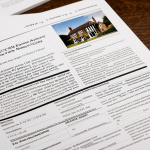Essential Steps for Selling Inherited Property in the UK
Selling inherited property in the UK requires navigating the probate process, which validates the deceased’s will and grants legal authority to sell. This process can significantly affect the sale timeline, often taking several months depending on estate complexity. Understanding probate is vital before proceeding to avoid unexpected delays.
Next, gathering the necessary legal documents and permissions is crucial. These include the grant of probate or letters of administration, which legally allow the sale. Sellers must also check for any restrictions, such as disputes or outstanding debts on the property, to ensure compliance with legal requirements.
Also to see : Unearthing opportunities: how uk property investors can thrive in the green building revolution
The inherited property selling steps typically start with confirming legal authority, followed by a property valuation, listing for sale, and finally completing the transaction. Each phase is essential and must be carefully managed to prevent setbacks. The timeline from inheritance to sale completion often spans from three to twelve months, factoring probate and market conditions.
By understanding these crucial steps and the associated legal framework, sellers can confidently manage the process and progress smoothly toward selling their inherited property in the UK.
Also to discover : Unique strategies for uk developers to achieve biodiversity net gain compliance
Assessing Value and Maximizing Appeal
Accurately valuing inherited property is a foundational step when selling inherited property UK owners face. Professional property valuation often involves local estate agents or qualified surveyors who assess market trends, property condition, and comparable sales nearby. This ensures a realistic selling price aligned with current demand. How to value inherited property precisely? It requires a combination of expert inspection and up-to-date market analysis to avoid undervaluing or overpricing.
Preparing property for sale involves more than valuation. Enhancing the property’s appeal can significantly impact the final sale price. Simple improvements such as fresh paint, garden tidying, or minor repairs add value and create a positive first impression for buyers. Sellers should focus on clean, neutral décor and fixing obvious defects to attract a wider audience.
Costs during preparation and valuation include professional fees for surveyors, minor renovation expenses, and possibly energy performance certificates if required by legal requirements. These upfront costs often facilitate smoother sales and better offers, making them a worthwhile investment in the inherited property selling steps. Proper preparation paired with accurate property valuation helps achieve the best possible outcome when selling inherited property UK executors manage.
Navigating Tax Implications and Legal Considerations
Understanding inheritance tax UK is crucial when selling inherited property UK beneficiaries face. Typically, inheritance tax applies if the estate’s value exceeds the current nil-rate band (£325,000 as of 2024). Executors must notify HMRC and may need to pay tax before the property sale. This step often impacts the timing of the entire selling process.
Capital gains tax on inherited property arises when selling above its market value at the date of death. The gain is calculated based on the property’s value at inheritance, not original purchase price. This means executors or beneficiaries pay tax on the profit made since inheritance, depending on applicable reliefs and allowances.
Legal requirements for selling inherited property include securing probate, as discussed, and ensuring clear title transfer through correct documentation. Failure to comply with these can lead to disputes or delays.
To reduce tax liabilities, consulting a tax professional early is advisable. They help identify reliefs like the spouse exemption or Principal Private Residence Relief if applicable. Understanding these tax and legal considerations helps sellers plan effectively and avoid unexpected costs or legal complications during the sale.
Choosing the Best Sale Method for Profit
Selecting the best way to sell inherited property UK sellers can maximize profit and reduce hassle. Common methods include selling via estate agents, private sales, or property auctions UK. Each option offers distinct advantages depending on your priorities: speed, price, and control.
Selling through estate agents provides professional marketing and wider audience reach, typically achieving better market prices but often takes longer due to listing and negotiation stages. Estate agents charge fees, but their expertise can streamline the process.
Property auctions UK offer a faster sale, often within weeks, suited for sellers prioritizing quick completion over maximum price. Auctions carry risk of lower sale prices but reduce costs from marketing and prolonged holding.
Private sale options, where sellers negotiate directly with buyers, can save commissions and offer control but require market knowledge and patience to find suitable buyers without professional support.
Choosing the right method depends on specific needs. Executors should weigh timing against expected returns. For instance, auction suits urgent sales, while estate agents may better serve those seeking top value. Understanding these differences helps execute inherited property selling steps with confidence.
Essential Steps for Selling Inherited Property in the UK
The probate process initiates the legal journey for selling inherited property UK owners face. Probate confirms the will’s validity and grants executors the authority to manage the estate, including selling property. This process typically spans several months, impacting the overall selling timeline significantly. Delays often arise from estate complexity or disputes, so a clear understanding accelerates progress.
Sellers must acquire specific legal documents before proceeding: primarily, the grant of probate or letters of administration, which officially permit property sale. Missing these documents can stall the sale or lead to legal challenges. Additionally, identifying any legal restrictions, such as outstanding debts on the estate or contested ownership, is vital to comply with legal requirements and secure a clean title transfer.
The inherited property selling steps flow in a structured timeline. After confirming legal authority through probate, owning parties should arrange a property valuation, then list the property via the chosen sale method, proceeding to negotiation and completion. This full process from inheritance to sale closure generally takes between three to twelve months, depending on legal and market factors. Staying vigilant about each step prevents costly setbacks and ensures compliance.






